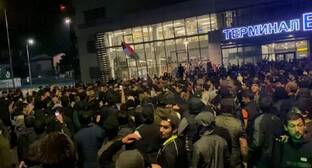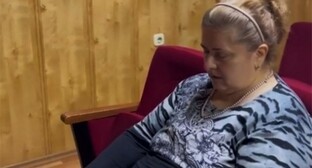26 February 2018, 09:10
Week in the Caucasus: review of main events of February 19-25
Mourning events to mark the anniversary of the deportation of Chechen and Ingush people; determination of the main candidate for the post of the Armenian President; AI's criticism of human rights situation in Russia and the countries of Southern Caucasus, – see the review of these and other events in the Caucasus during the week of February 19-25, 2018, prepared by the "Caucasian Knot".
Residents of Southern Russia mark Fatherland Defender's Day and anniversary of deportation of Chechen and Ingush people
On February 23, Northern Caucasus hosted events to mark the 74th anniversary of the Stalin deportation of the Vainakh people and festivities to celebrate the Fatherland Defender's Day. In Instagram, residents of Ingushetia criticized the leader of the republic for his congratulations "on the 100th anniversary for the creation of the Workers' and Peasants' Red Army." Ingush activists reproached the authorities of the republic of lack of principles and noted that the Fatherland Defender's Day should not be celebrated on February 23. Residents of Ingushetia paid tribute to the victims of deportation with prayers and alms, and they left gates of their houses open as a sign of mourning. In the Nasyr-Kort District of Nazran, a mourning rally took place near the memorial complex "Nine Towers". According to the authorities, it was attended by 10,000 people. Chechnya held no events to mark the anniversary of the deportation, since in 2011, by the authorities' decision, the Day of Remembrance and Sorrow was rescheduled from February 23 to May 10. However, residents of the region said that despite the ban of the authorities, they paid tribute to the memory of their relatives who died during the deportation. Besides, the mourning events were held in the village of Yaryk-Su in the Novolak District of Dagestan. The morning events in the Dagestani village were also attended by residents of the neighbouring villages of Chechnya, who confirmed their intention to pay tribute to the victims of the deportation precisely on the historical date of the events, rather than on the date set up by the authorities.
On February 22, an action to mark the anniversary of the day on which in 1944 the deportation of the Ingush people was started took place near the memorial "The Wall of Sorrow" in Moscow, and on February 23, the same action was held in the Anna Akhmatova's Museum in the Fountain House in Saint Petersburg. In Istanbul, members of the Chechen Diaspora held an evening to pay tribute to the victims of the deportation of Chechen and Ingush people to Central Asia.
Armenia determines main candidate for presidency
On March 2, the Armenian Parliament is to elect the fourth president of the country. On February 23, the ruling Republican Party of Armenia and the ARF "Dashnaktsutyun" nominated as a presidential candidate Armen Sargsyan, Armenian Ambassador to Great Britain. The opposition parliamentary faction of the "Elk" bloc started collecting signatures of MPs under an appeal to the Constitutional Court with the request to recognize the provisions on the election as unconstitutional and to elect the new Armenian president by national voting. In January, the "Elk" bloc voiced its candidacy for the post of president: MP Artak Zeinalyan, a member of the "Republic" Party. When offering its candidacy, the "Elk" bloc counted on the support of the "Tsarukyan", another opposition bloc, but failed. After the "Tsarukyan" bloc refused to support Artak Zeinalyan, a candidate from the Republican Party of Armenia will become the leader of the state. This opinion was voiced by political analysts interviewed by the "Caucasian Knot". On February 24, members of the "Tsarukyan" bloc stated that they would support Armen Sargsyan. Thus, the presidential election in Armenia can be held with a single candidate. The law does not prohibit that, notes Arpine Ovannisyan, Vice-Speaker of the Armenian Parliament.
It should be noted that in connection with the constitutional changes in Armenia, after the presidential term of Serzh Sargsyan expires on April 9, 2018, the first person of the country will be not the President, but the Prime Minister. On that day, the Parliament will transfer powers to the new President, and the Prime Minister and the government will resign.
AI criticizes human rights situation in Russia and countries of Southern Caucasus
On February 22, the international human rights organization "Amnesty International" (AI) published a report on the human rights situation in the world in 2017. This year showed "undermining of the very system of human rights protection." For the first time in a long time, serious problems in the human rights sphere are faced by the countries that have always called themselves guarantors of democracy: the US, Australia, and the Western European countries. The AI's report mentions persecution of religious minorities and dispersals of opposition rallies throughout Russia, illegal detentions and torture in Northern Caucasus, and harassment of gays in Chechnya. The AI is also concerned about the situation in the countries of Southern Caucasus. The rights defenders note persecution of activists in Azerbaijan, violations of the defendants' rights in the case against the "Sasna Tsrer" (Daredevils of Sassoun) in Yerevan, and abuse of power by the police in Georgia.
Georgia accuses Russia of death of Georgian citizen after his detention in South Ossetia
On February 23, the KGB for South Ossetia reported that Archil Tatunashvili, a citizen of Georgia, detained on suspicion of plotting an act of sabotage, died in a hospital. Acute heart failure was reported to be the cause of the detainee's death. Meanwhile, according to the law enforcement bodies, that was preceded by the use of physical force against the man after he had attempted to seize a pistol from a warder. Georgia demanded to provide the detailed information about the Archil Tatunashvili's death and allow experts of the National Bureau of Forensic Expertise examining the body. Russia controls the territory of South Ossetia and therefore the country is directly responsible for the death of the detainee, the Georgian Ministry of Foreign Affairs (MFA) stated. Together with Archil Tatunashvili, two more Georgian citizens Levan Kutashvili and Ioseb Pavliashvili were detained in South Ossetia. On February 24, they were released.
In Dagestan, victims of attack on believers buried; Kizlyar residents report detentions of their relatives
After people were shelled near an Orthodox church in Kizlyar, February 20 was announced to be a day of mourning in the city. On that day, the killed women were buried, and the funeral ceremony was attended by about 5000 people. In accordance with the archbishop's decision, the victims were buried at the church cemetery. Sources called assailant Khalil Khalilov a member of a "dormant unit" of the terrorist organization "Islamic State" (IS) banned in Russia, which later claimed responsibility for the attack. The experts interviewed by the "Caucasian Knot" believe the assailant was a "lone wolf" and was not directly connected with the IS. Investigators consider a terror act as one of the versions. After the shooting in the city, law enforcers began to detain young people familiar with Khalil Khalilov. Relatives of the detainees have claimed they are not guilty and complained that they are not aware of the young people's whereabouts, the "Dozhd" (Rain) TV Channel reports.
Pre-election pickets take place in cities of Southern Russia
On February 19, in Astrakhan, Volgograd, Vladikavkaz, and Elista, activists conducted pickets at regional election commissions. The picketers demanded to update the lists of voters prior to the presidential election to be held on March 18, to remove double entries and irrelevant data. On February 17, the pre-election campaigns of eight candidates have been started. However, the survey of residents in cities of Southern Russia showed that the pre-election campaigns are not active. On the streets of Rostov-on-Don and the cities of the Krasnodar Territory, posters of three candidates, including Putin, Grudinin and Zhirinovsky, prevail. In the Volgograd Region, journalists have noted that even the posters of the incumbent President are represented on the streets in rather modest number.




